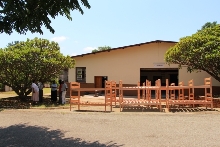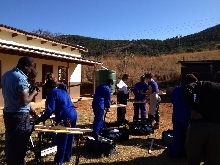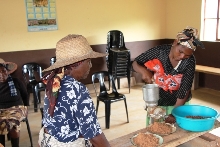Tools for Life
Tools for Life Project: Enhancing Employability of English Women & Swazi Women through Sustainable Carpentry Training in Swaziland
The primary goal of the project is to enhance the employability and contribute to the sustainable livelihoods of UK women and rural Swazi women living with HIV/AIDS through vocational and skill training in Swaziland.
Bringing together women from the UK who have undergone training in carpentry and women in Swaziland who have identified a market in their communities for wood products, the project enables all of these women to learn, grow and ultimately improve the opportunities in their home countries.
The core objectives are:
a) Enhance the confidence, training, and skills of English women to secure employment in the carpentry sector;
b) Promote the financial support, training and skills of Swazi women living with HIV/AIDS to secure self-employment in the carpentry sector; and
c) Foster sustainable community ownership and income in a cooperative and holistic manner (community saving schemes).
The project consists of four phases:
Phase 1: Over a 1-month period the English women will receive training on Swazi culture, carpentry workshop facilitation, and specialised woodworking product building prior to traveling to Swaziland.
Phase 2: 10 rural Swazi women will be trained at a workshop in Manzini (6 weeks). This will give the Swazi women a strong basic understanding of carpentry skills in a formal environment. During this course they will learn to make a number of basic objects and become familiar with hand tools and basic machinery. During this time there will also be training on bookkeeping and resource management.
Phase 3: 9 English women will travel to Swaziland and train 10 rural Swazi women in their community, with hand tools (4-6 weeks). This training will enable the Swazi women to gain confidence in making one or two items with the equipment that is available at their community level, to a high standard. At the same time the UK women will equally build their skills. This phase will also see community level support in managing resources to establish a sustainable business.
Phase 4: Monitoring and Evaluation (On-going/-bi-annual site visit for 2 years). SWAPOL continues to support the community based groups and will use its network to facilitate the production and the sale of the products.
Project site
Rural outskirts of Manzini (Map)
Beneficiaries
10 rural Swazi women and 9 women from the UK benefit directly from the training
Indirectly, a) all local women and children benefit from the project through the community saving schemes and b) all local men engaged in tools for life health, financial and business training, and particularly the husbands of the 10 Swazi women carpenters benefit from the project.
Project costs and assistance by sahee
The entire project costs are CHF 70’000.–, whereas sahee takes over CHF 15’000.–.
Sahee contributes CHF 15'000. Sahee stays in regular contact with the project leaders, monitors the activities and visits the project on site.
Duration of assistance
1st of January 2013 to 30th of June 2014
Local counterpart
Swaziland for Positive Living (SWAPOL)
generate PDF of project
Project overview



